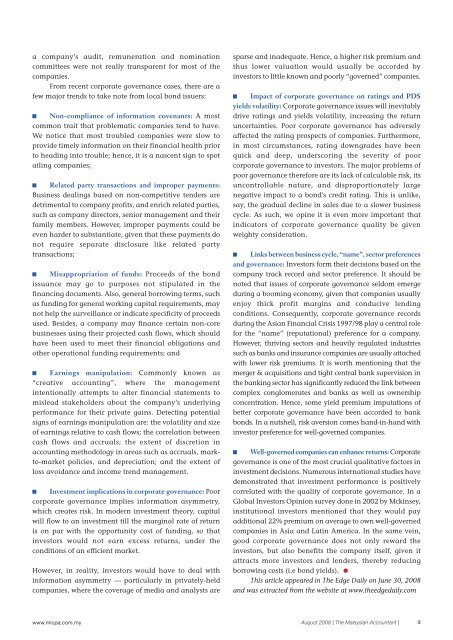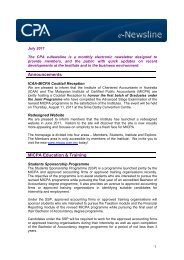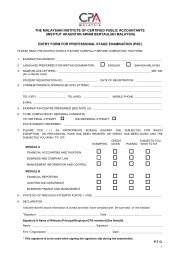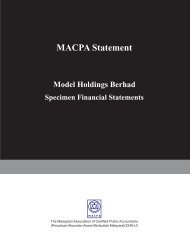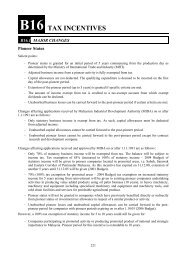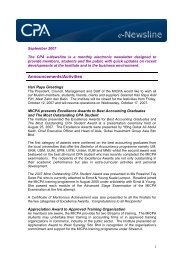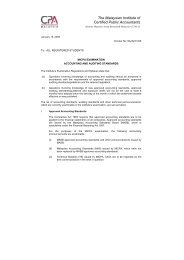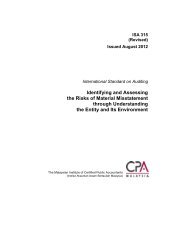november 2008 examination - The Malaysian Institute Of Certified ...
november 2008 examination - The Malaysian Institute Of Certified ...
november 2008 examination - The Malaysian Institute Of Certified ...
You also want an ePaper? Increase the reach of your titles
YUMPU automatically turns print PDFs into web optimized ePapers that Google loves.
a company’s audit, remuneration and nominationcommittees were not really transparent for most of thecompanies.From recent corporate governance cases, there are afew major trends to take note from local bond issuers:Non-compliance of information covenants: A mostcommon trait that problematic companies tend to have.We notice that most troubled companies were slow toprovide timely information on their financial health priorto heading into trouble; hence, it is a nascent sign to spotailing companies;Related party transactions and improper payments:Business dealings based on non-competitive tenders aredetrimental to company profits, and enrich related parties,such as company directors, senior management and theirfamily members. However, improper payments could beeven harder to substantiate, given that these payments donot require separate disclosure like related partytransactions;Misappropriation of funds: Proceeds of the bondissuance may go to purposes not stipulated in thefinancing documents. Also, general borrowing terms, suchas funding for general working capital requirements, maynot help the surveillance or indicate specificity of proceedsused. Besides, a company may finance certain non-corebusinesses using their projected cash flows, which shouldhave been used to meet their financial obligations andother operational funding requirements; andEarnings manipulation: Commonly known as“creative accounting”, where the managementintentionally attempts to alter financial statements tomislead stakeholders about the company’s underlyingperformance for their private gains. Detecting potentialsigns of earnings manipulation are: the volatility and sizeof earnings relative to cash flows; the correlation betweencash flows and accruals; the extent of discretion inaccounting methodology in areas such as accruals, markto-marketpolicies, and depreciation; and the extent ofloss avoidance and income trend management.Investment implications in corporate governance: Poorcorporate governance implies information asymmetry,which creates risk. In modern investment theory, capitalwill flow to an investment till the marginal rate of returnis on par with the opportunity cost of funding, so thatinvestors would not earn excess returns, under theconditions of an efficient market.However, in reality, investors would have to deal withinformation asymmetry — particularly in privately-heldcompanies, where the coverage of media and analysts aresparse and inadequate. Hence, a higher risk premium andthus lower valuation would usually be accorded byinvestors to little known and poorly “governed” companies.Impact of corporate governance on ratings and PDSyields volatility: Corporate governance issues will inevitablydrive ratings and yields volatility, increasing the returnuncertainties. Poor corporate governance has adverselyaffected the rating prospects of companies. Furthermore,in most circumstances, rating downgrades have beenquick and deep, underscoring the severity of poorcorporate governance to investors. <strong>The</strong> major problems ofpoor governance therefore are its lack of calculable risk, itsuncontrollable nature, and disproportionately largenegative impact to a bond’s credit rating. This is unlike,say, the gradual decline in sales due to a slower businesscycle. As such, we opine it is even more important thatindicators of corporate governance quality be givenweighty consideration.Links between business cycle, “name”, sector preferencesand governance: Investors form their decisions based on thecompany track record and sector preference. It should benoted that issues of corporate governance seldom emergeduring a booming economy, given that companies usuallyenjoy thick profit margins and conducive lendingconditions. Consequently, corporate governance recordsduring the Asian Financial Crisis 1997/98 play a central rolefor the “name” (reputational) preference for a company.However, thriving sectors and heavily regulated industriessuch as banks and insurance companies are usually attachedwith lower risk premiums. It is worth mentioning that themerger & acquisitions and tight central bank supervision inthe banking sector has significantly reduced the link betweencomplex conglomerates and banks as well as ownershipconcentration. Hence, some yield premium imputations ofbetter corporate governance have been accorded to bankbonds. In a nutshell, risk aversion comes hand-in-hand withinvestor preference for well-governed companies.Well-governed companies can enhance returns: Corporategovernance is one of the most crucial qualitative factors ininvestment decisions. Numerous international studies havedemonstrated that investment performance is positivelycorrelated with the quality of corporate governance. In aGlobal Investors Opinion survey done in 2002 by Mckinsey,institutional investors mentioned that they would payadditional 22% premium on average to own well-governedcompanies in Asia and Latin America. In the same vein,good corporate governance does not only reward theinvestors, but also benefits the company itself, given itattracts more investors and lenders, thereby reducingborrowing costs (i.e bond yields).This article appeared in <strong>The</strong> Edge Daily on June 30, <strong>2008</strong>and was extracted from the website at www.theedgedaily.comwww.micpa.com.myAugust <strong>2008</strong> | <strong>The</strong> <strong>Malaysian</strong> Accountant |9


